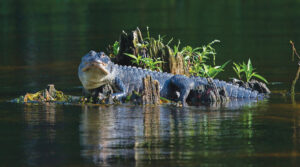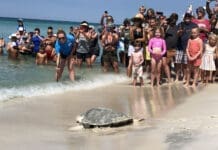 With summer in full swing, many people are working and recreating near Florida’s lakes, rivers and wetland areas. Warm temperatures also mean alligators are more active and visible. While serious injuries caused by alligators are rare in Florida, the Florida Fish and Wildlife Conservation Commission recommends taking the following precautions when in and around the water to prevent conflicts with alligators:
With summer in full swing, many people are working and recreating near Florida’s lakes, rivers and wetland areas. Warm temperatures also mean alligators are more active and visible. While serious injuries caused by alligators are rare in Florida, the Florida Fish and Wildlife Conservation Commission recommends taking the following precautions when in and around the water to prevent conflicts with alligators:
• Keep a safe distance if you see an alligator.
• Never feed an alligator. When fed, alligators can lose their natural wariness and instead learn to associate people with the availability of food. This can lead to dangerous circumstances for yourself and other people who could encounter the alligator in the future.
• Feeding alligators is illegal and dangerous in Florida. If you see someone feeding an alligator, call FWC’s Wildlife Alert at 888-404-FWCCor visit MyFWC.com/WildlifeAlert.
• Swim only in designated swimming areas during daylight hours. Alligators are most active between dusk and dawn.
• Keep pets on a leash and away from the water’s edge and never let them swim in fresh or brackish water even for short periods of time. Pets often resemble alligators’ natural prey. Allowing your pet in the water for even short periods to cool off or play can result in its death.
Call the FWC’s Nuisance Alligator Hotline at 866-FWC-GATOR(866-392-4286) if you believe an alligator poses a threat to people, pets or property and the FWC will dispatch a contracted nuisance alligator trapper to resolve the situation. The FWC places the highest priority on public safety and administers a Statewide Nuisance Alligator Program (SNAP) to proactively address alligator threats in developed areas, while conserving alligators in areas where they naturally occur.
Find more resources about living with alligators at MyFWC.com/Alligator.
The American alligator, Florida’s state reptile, is a conservation success story. Florida has a healthy and stable alligator population, which is estimated at 1.3 million alligators of every size. They are found in freshwater lakes, ponds, swamps and slow-moving rivers in all 67 counties in Florida.























































